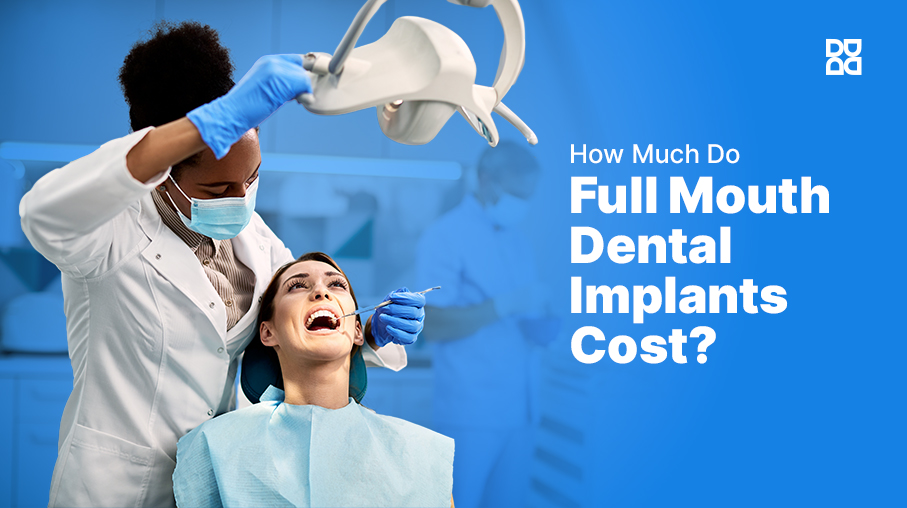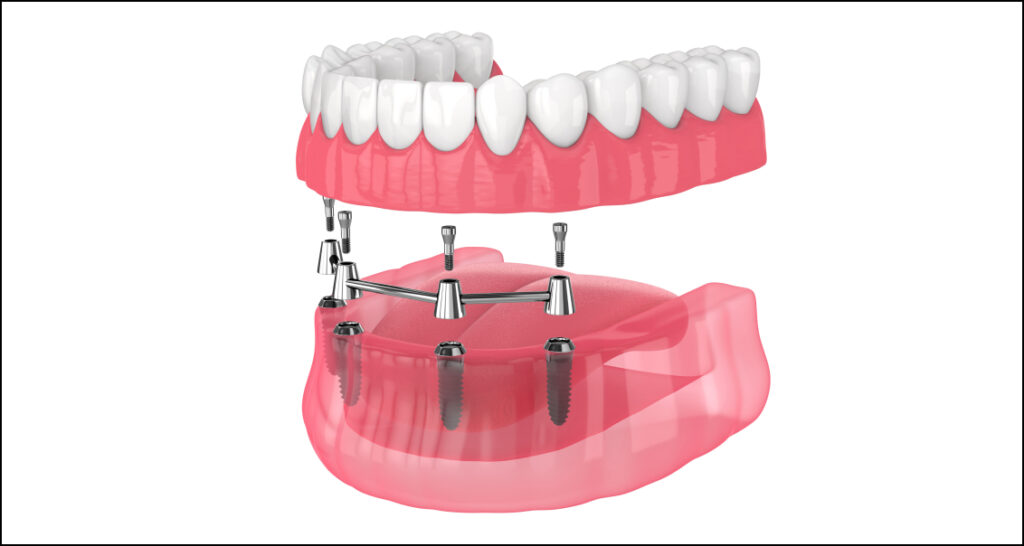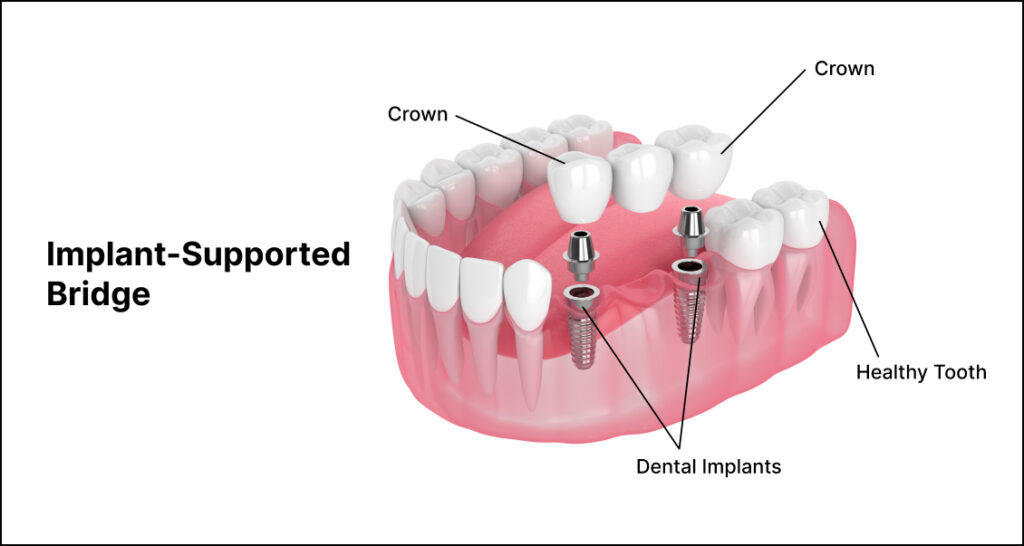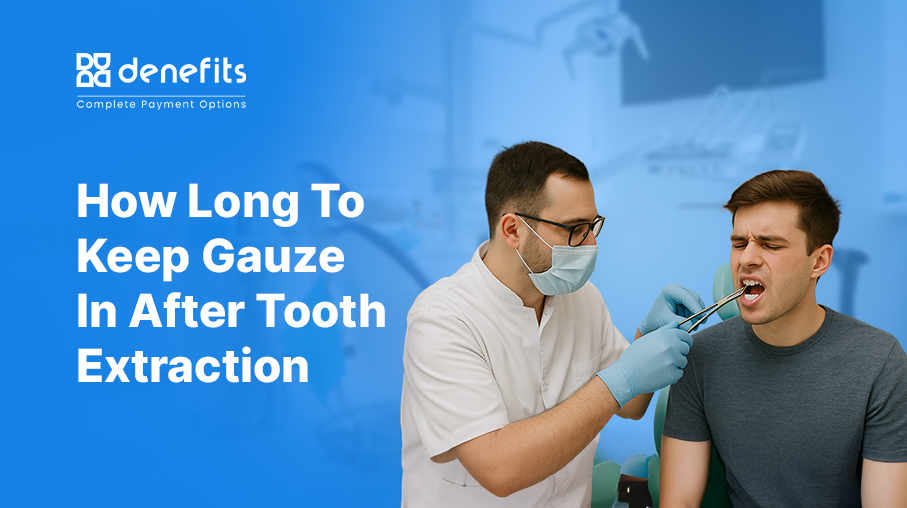
178 million Americans suffer from tooth loss, with 40 million missing all their teeth. However, the annual number of dental implant treatments remains relatively low, standing at approximately 2.5 million. These numbers indicate why dental implants cost significantly high. That said let’s get a brief overview of the costs associated with dental implants in 2024.
A single implant costs between $3,000 to $4,500 on average. But, according to Forbes Health, if you're considering full-mouth dental implants, the cost can range anywhere from $60,000 to $90,000.
Many customers base their decision to have their smiles restored on their insurance coverage or the availability of financing options. If you're considering getting full mouth implants, continue reading to learn more about the costs involved and possible ways to make payments easier.
What Is the Average Cost of Full-Mouth Dental Implants?
Dental implants cost depends on the type of implants, materials, and other factors. Here are the full-mouth teeth restoration dental implant options and their average costs:
1. Implant-Supported Dentures
Implant-supported dentures help replace several teeth at once. The procedure is quite similar to traditional dentures, the only difference being that in the case of implant-supported dentures, the appliance does not sit on your gums, instead it directly connects to your jawbone with dental implants. Thus leading to better eating support and long-term stability.

Average cost: $1,500–$4,000 per arch and $6,000–$8,000 for full mouth (i.e., the upper denture implants cost + lower dentures cost). The cost also fluctuates as per the no. of implants needed to support each arch.
Longevity: 10 to 20 years
2. Implant-Supported Bridge
These are also known as all-on-6 implants or all-on-4 implants. The process involves replacing missing teeth with a dental bridge that consists of implants with fake teeth in between. They provide a natural look, better stability, and are pretty durable. This option is viable when patients have enough gum tissue to support implants. The implant-supported bridge prevents bone degeneration and supports the facial structure.

Average Cost: $10,000–$20,000 per arch. For a full mouth, which usually involves 10-12 implants, the cost ranges from $25,000 to $50,000, sometimes even higher.
Longevity: 10 to 20 years.
3. Single Tooth Dental Implants
When patients need multiple-tooth dental implants that aren’t in one place, replacing them one by one with single-tooth implants is ideal. This option is viable for patients who have a majority of their teeth and require a few implants in different areas. So, they can opt for a single tooth implant whenever a tooth needs replacement. It's a long-term solution that can last a lifetime with proper care and maintenance.
Average Cost: $3,100–$6,000 or higher per implant. This means $15,000 to $30,000 or more per arch. And the overall cost range for full-mouth implants varies from $60,000 to $90,000.
Longevity: Lifetime
3 Major Factors That Determine the Cost
The cost of dental implant installation for single, multiple, or full-mouth teeth replacement can usually vary depending on various factors, like:
A. Material Used
The type of material and quality of the dental crown, abutment, and implant also affect the overall cost of the procedure. Higher-quality implants are certainly pricier.
Here’s the average cost of implants, depending on the material used:
- Porcelain: $975-$5000 per tooth.
- Titanium: $500-$3,000 per tooth.
- Ceramics: $3,500-$5,000 per tooth.
- Zirconia: $3,000-$7,000 per tooth.
B. No. of Implants
Generally, 4, 6, or 8 implants are used per arch to affix dentures, or the dental bridge. So, if we consider the single implant cost (not considering insurance) to be somewhere around $2,800, then the final cost for a 4-implant supported arch would be appx. $11,200, excluding any additional costs.
However, if single implants are used for each tooth, then the cost is much higher, compared to other procedures.
C. Additional Procedures (tooth extraction, bone grafting, gum grafting, or sinus lift)
Many patients who require full mouth implants are aged 65–75. Hence, their gums may have weakened over time, with an impact on the jawbone. So they may require bone grafting, gum, grafting, or other associated procedures to prepare for dental implant installation, adding to the overall cost.
Associated Procedures Related to Dental Implants Along with Their Estimated Average Cost
| Procedure | Average Cost Range |
|---|---|
| Gum Grafting | $600–$1,200 per tooth |
| Bone Grafts | $300–$800 each graft |
| Sinus Lift | $1500 and $3000 per arch ($3000 to $5000 on both sides) |
| Abutments | $700–$2000 |
| Dental Crowns | $800–$3000 |
| Anesthesia | $50–$100 |
| Pre-op tests | $50–$200 |
| Tooth Extraction | $150–$300 per tooth |
| Tooth Cleaning | $75–$200 |
How to Pay for Full Mouth Dental Implants?
1. Dental Insurance
Most dental insurance plans generally cover half the cost, i.e., 50% to a maximum of 80% (if eligible). This means that patients with good insurance coverage can expect to pay the rest either using savings or in flexible monthly payments.
2. Dental Financing
Many providers nowadays have in-house financing options or use third-party providers for financing, such as CareCredit, AccessOne, Denefits, etc. While all these options have their unique differentiating point, Denefits enables dental care practices to meet different budgetary requirements. At the same time, it allows practices to meet their goals by opening doors to more secure transactions, without extra costs—an added advantage not commonly found in financing scenarios.
3. Flexible Payment Plans
It's the best way to split the cost over a given term. Payment solutions such as Denefits enable providers to offer flexible payment plans that fit the financial needs of patients. So, while patients enjoy the ease of paying monthly, dental practices receive regular cash flow.
4. Payment Plans With Deferred Interest
A ‘deferred interest payment plan’ allows patients to pay off their dues for a specific period without interest. For instance, Denefits offers an EZ payment plan with a 12-month deferred period. So, if the patient pays off the whole amount within the deferred period, they can easily avoid paying interest, which in most cases is accrued later.
5. HSAs and FSAs
Dental implants usually come under eligible dental procedures that can be covered using the HSA and FSA accounts. So, patients can prepare themselves financially by setting aside money in their tax-advantaged FSA or HSA accounts to cover the difference, if insurance does not provide full coverage.
Final Thoughts
The full-mouth dental implant procedure is ideal for patients who have lost most of their teeth and want to restore their smile. It goes beyond aesthetics, as missing teeth not only impacts appearance but also oral health. While the steep costs may become a hindrance for many, there are several alternatives to ease the burden of payment.
It's best to consult with your dentist regarding available dental financing platforms and flexible payment options.
For more information on dental financing, feel free to write to us.
Frequently Asked Questions (FAQs)
1. How Much Do Fake Teeth Cost For Full Mouth Teeth Restoration?
It depends on which tooth restoration option you choose. For instance, dentures with fake teeth cost between $500–$1,500 per arch, whereas for implant-supported dentures the cost can range somewhere between $6k–$8k. On the other hand, dental bridges with all-on-4 or all-on-6 dental implants cost range from $10k to $20k per arch. And, implants for each tooth are the most expensive, totaling between $50k to $60k, overall.
2. Which Type of Mouth Dental Implants Are the Cheapest?
Although dental implants are generally expensive, some options come at significantly lower prices, such as implant-supported dentures. It's the cheapest option for full mouth teeth restoration with an average cost ranging from $6,000 to $10,000.
3. Why Do Some Dental Implants Cost More?
The cost may vary based on the complexity of the procedure, the materials used, the expertise of the dental surgeon, and the cost of any other associated procedures (if needed).
4. How Much Does a Bone Graft Cost Without Insurance?
The dental bone graft cost is usually between $300 to $800 per graft. It is essential when the patient’s jaw does not have enough bone to support the implant.
5. How to Pay for Dental Implants?
Here are 7 ways to pay for dental implants:
1. Savings Account
2. Dental Insurance
3. Dental Financing
4. Flexible Spending Account (FSA)
5. Health Savings Account (HSA)
6. Dental Grants
7. Dental Schools


